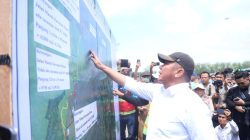Advisor to CM on Information, Barrister Saif has emphasized that reproductive health is not merely a health issue but also a cornerstone of sustainable national development.
While addressing a workshop on Peshawar Media coalition on Reproductive Health here on Thursday, he stated that the quality of a population, rather than its size alone, determines the trajectory of a nation’s progress.
Barrister Saif stated that under Chief Minister Ali Amin Khan Gandapur, the Khyber Pakhtunkhwa government has launched key maternal health initiatives, including nutrition support for expectant mothers, the ‘NourishMaa’ campaign to improve maternal nutrition, and extensive training programs for healthcare providers.
Tolong support kita ya,
Cukup klik ini aja: https://indonesiacrowd.com/support-bonus/
The Integrated Health Project has unified various health services for better delivery. These efforts aim to reduce maternal mortality and improve healthcare access across the province.
He further revealed that during his tenure as Prime Minister, PTI founder Imran Khan had launched major initiatives to improve maternal health in Pakistan. The Sehat Sahulat Program provided free health insurance covering maternity care for millions.
He initiated the construction of mother and child hospitals, notably a 200-bed facility in Attock. Through the Ehsaas Programme, maternal nutrition was prioritized with supplements and awareness drives.
Additionally, micro health insurance under Kamyab Pakistan offered free services to millions, including maternal care. These efforts significantly enhanced access to quality maternal health services nationwide.
Support us — there's a special gift for you.
Click here: https://indonesiacrowd.com/support-bonus/
‘Reproductive health and family planning are fundamental elements in shaping a productive and healthy society. A well-facilitated and health-conscious population is a prerequisite for national development,’ Barrister Saif remarked.
He pointed out that the persistent gap between policy and its implementation is one of Pakistan’s critical challenges. While acknowledging the existence of policy frameworks at national level, Barrister Saif noted that real progress requires reducing the gap between policy formulation and its implementation.
‘A developed nation is not one that merely drafts sound policies, but one that ensures their timely and equitable execution. We must shift from reactive to proactive governance if we are to truly address our social challenges,’ he asserted.
Barrister Saif underscored the need for building ‘acceptable social awareness’ around reproductive health. He stated that campaigns must be designed in ways that align with local customs, values, and religious sensitivities.
‘Social awareness is not about imposing alien concepts, it’s about creating understanding that is contextually acceptable,’ he said. ‘Programs must be shaped with respect for our social realities and moral frameworks. If we fail to recognize this, we risk backlash, resistance, and ultimately failure.’
Concluding his address, Barrister Saif urged the media to play its role as a responsible partner in development, using its platforms to raise awareness, counter misinformation, and advocate for evidence-based health initiatives.
Provided by SyndiGate Media Inc. (
Syndigate.info
).







